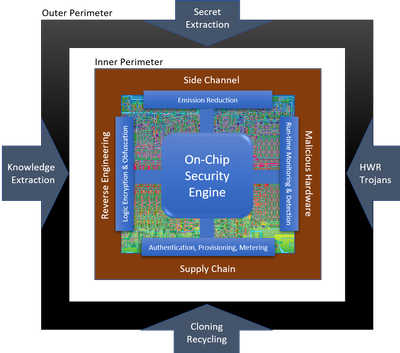
Engineers at UC San Diego have been selected by DARPA to participate in the Automatic Implementation of Secure Silicon (AISS) program to increase the security of our nation’s semiconductor supply chain. Through a team of academic, government and industry partners, the AISS program aims to automate the process of incorporating scalable defense mechanisms into semiconductor chip designs, while allowing designers to explore chip economics versus security trade-offs based on the expected application.
AISS is composed of two teams of researchers and engineers who will explore the development of a novel design tool and IP ecosystem – which includes tool vendors, chip developers, and IP licensors – allowing defenses to be incorporated efficiently into chip designs. The expected AISS technologies could enable hardware developers to not only integrate the appropriate level of state-of-the-art security based on the target application, but also balance security with economic considerations like power consumption, die area, and performance.
UC San Diego engineers will work on the team led by Synopsys, an electronic design automation company, as prime contractor. Engineers led by Sujit Dey, a professor of Electrical and Computer Engineering and director fo the Center for Wireless Communications at the Jacobs School, will create a framework to allow developers of new machine vision and artificial intelligence algorithms to more efficiently take advantage of both embedded software and hardware accelerators, resulting in optimized system-on-chip architectures which can meet desired power, area and speed metrics, with security built in to the process.
“We are developing a framework which ultimately will let developers of new machine vision and machine learning algorithms specify their application at a high level, and our methodology will come up with a very efficient hardware-software co-design implementation for them to use,” said Dey.
Dey and his team will collaborate with Anand Raghunathan from Purdue University on this task. The rest of the larger Synopsys-led team includes Arm, Boeing, Florida Institute for Cybersecurity Research at the University of Florida, Texas A&M University, and UltraSoC.
The AISS program is part of DARPA’s larger Electronics Resurgence Initiative, which engineers at the Jacobs School are also part of; electrical engineering Professor Andrew Kahng is leading a multi-institution project which aims to develop electronic design automation tools for 24-hour, no-human-in-the-loop hardware layout generation.
This research was, in part, funded by the U.S. Government. The views and conclusions contained in this document are those of the authors and should not be interpreted as representing the official policies, either expressed or implied, of the U.S. Government.
Media Contact
Katherine Connor
Jacobs School of Engineering
Phone: 858-534-8374
khconnor@eng.ucsd.edu
